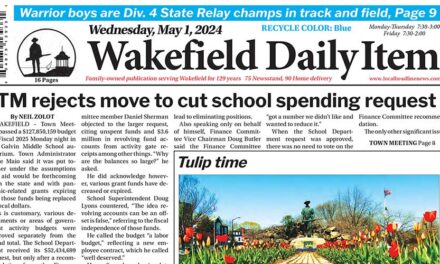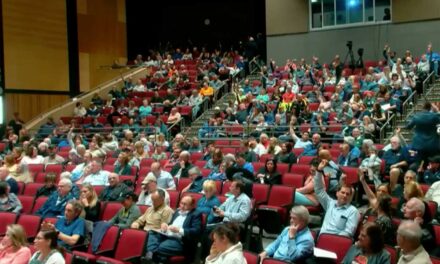By MARK SARDELLA
There are few responsibilities easier for citizens to fulfill than voting. Last week, the Massachusetts Supreme Judicial Court agreed, at least when it comes to requiring voters to be registered before election day. It’s a safeguard that allows city and town clerks to verify the eligibility of each would-be voter.
Why anyone would be against that is beyond me.
The SJC unanimously upheld the state’s 20-day voter registration deadline, passed in 1993 by the Massachusetts Legislature – you know, the representatives that we the people elected.
The ruling was a crushing blow to those who believe citizenship should be all benefits and no responsibilities.
The SJC decision held that the 20-day window does not disenfranchise any voter or particular group of voters, since voters can register before then. Somehow, the SJC seems to have gotten the idea that anyone interested in voting ought to be able to figure out that they need to be registered three weeks before an election.
Planning ahead. What a concept.
The SJC’s decision outraged those who believe that any Tom, Dick or Harry should be able to walk in to any polling place on election day, without showing any ID to prove who they are or where they live, and be handed a ballot, no questions asked.
What could possibly go wrong with a system like that?
Nothing at all, according to those interested in manipulating elections by any means possible. If people have to register ahead of time, it limits the pool of clueless “voters” that can be wooed on election day with a cup of coffee and a lift to the polls.
But for now, at least, the SJC has ruled that the right to vote ought to come with at least a minimum of personal responsibility – like actually knowing when the election is and that you have to be registered beforehand.
After all, the court observed, the Massachusetts secretary of state routinely informs residents of the registration deadline by distributing booklets in multiple languages and issuing public service announcements. City and town clerks also remind voters of local registration deadlines through press releases, flyers and municipal web sites.
All the recent measures to make voting “easier” like early voting, same-day registration and automatic voter registration are, at best, a solution in search of a problem. At worst, they are a recipe for voter manipulation and fraud.
Registering to vote involves one visit to your town or city hall. If that’s too onerous a burden, you can do it at Registry of Motor Vehicle offices as well as at other state agencies. If that’s still too arduous a task, you can register to vote online or by mail.
According to some, the most sacred privilege of a free society shouldn’t come with any personal responsibility whatsoever. Short of casting your vote, they think everything should be done for you. And, believe me, they would be happy to cast your vote if they thought they could get away with it.
But most registered voters don’t even cast their own votes, as we saw in the recent Special Election to decide on the funding for the Public Safety Building rehab. Nearly 90 percent of Wakefield voters managed to steer clear of the polls on June 26. Some didn’t even know there was an election. As soon as the news of the results got out on election night, people were on local online forums.
“There was an election?” they asked. “What was it about?”
When their apathy was questioned, the finger-pointing and excuse-making began. And they knew exactly who to blame. It was the town’s fault for failing to notify them personally.
Granted, it was a Special Election, and it was a week before the July 4th holiday, so you couldn’t expect the usual robust 20 percent participation of an annual Town Election.
But to miss the fact that there was a Special Election on June 26 you would have to have been blindfolded for the preceding month or trapped inside a cave in Thailand.
This newspaper ran the sample ballot at least four times. There were seven front-page articles prior to the election. It was discussed at televised, posted, open public meetings of the Town Council. The ballot was posted at Town Hall and other municipal buildings. The town’s web site featured the ballot and the date of the Special Election not to mention links to PowerPoint presentations and other information on the ballot question. There were traditional and digital signs placed around town announcing the Special Election. WCAT and the town held a televised public forum to discuss the Special Election ballot question.
The town did everything but send Steve Maio out to knock on every resident’s door.
Not enough, some argued. The town should do more to inform people of public meetings and elections.
How towns must notify citizens of government meetings is set out in the Massachusetts Open Meeting Law. The Attorney General’s Open Meeting Law Guide explains that notices of all public meetings must be posted “in, on, or near the municipal building in which the clerk’s office is located. In the event that meeting notices posted in the municipal building are not visible to the public at all hours, then the municipality must either post notices on the outside of the building or adopt the municipal website as the official method of notice posting.”
Wakefield has adopted the municipal website as the official posting method. Every meeting and agenda is posted on the site at least 48 hours ahead of time.
The Open Meeting Law Guide says that this openness must be balanced with the town’s “need to manage its operations efficiently.” So, the town is not required to send every single voter an engraved invitation notifying them of every public meeting or election. That would not be in keeping with “managing its operations efficiently,” considering that all of that information is two clicks away on the town’s web site.
Being an informed citizen requires a modicum of personal responsibility. If you don’t want that responsibility, that’s perfectly fine.
But if you miss something and need someone to blame, find a mirror.





